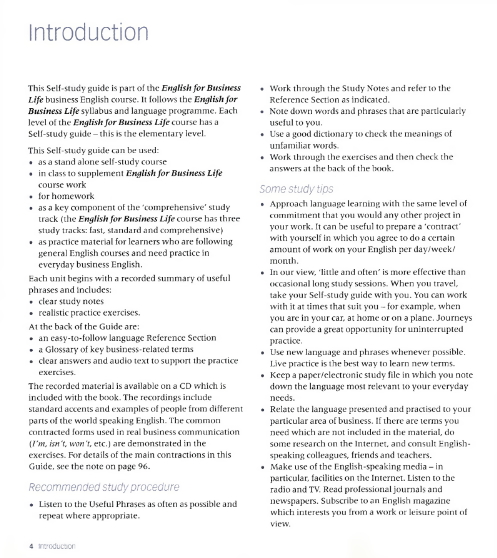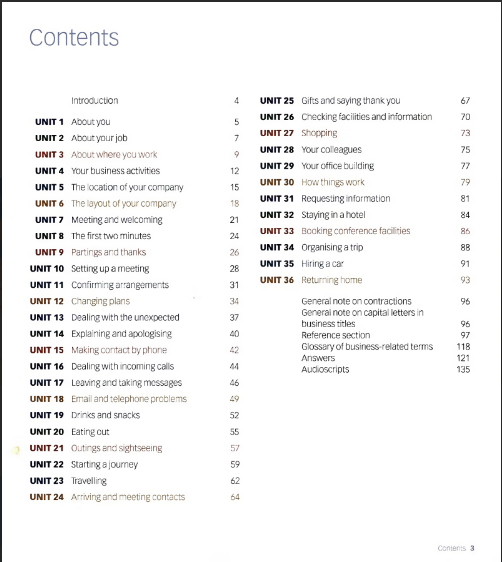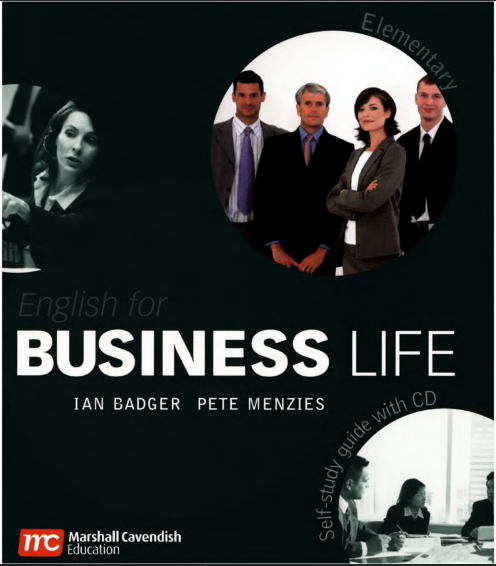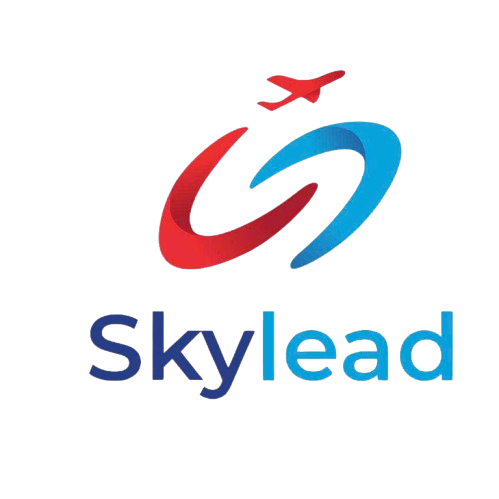


Mục lục
ToggleIntroduction
This Self-study guide is part of the English for Business Life business English course. It follows the English for Business Life syllabus and language programme. Each level of the English for Business Life course has a Self-study guide – this is the elementary level.
This Self-study guide can be used:
• as a stand alone self-study course
• in class to supplement English for Business Life course work
• for homework
• as a key component of the ‘comprehensive’ study track (the English for Business Life course has three study tracks: fast, standard and comprehensive)
• as practice material for learners who are following general English courses and need practice in everyday business English.
Each unit begins with a recorded summary of useful phrases and includes:
• clear study notes
• realistic practice exercises.
At the back of the Guide are:
• an easy-to-follow language Reference Section
• a Glossary of key business-related terms
• clear answers and audio text to support the practice exercises.
The recorded material is available on a CD which is included with the book. The recordings include standard accents and examples of people from different parts of the world speaking English. The common contracted forms used in real business communication (I’m, isn’t, won’t, etc.) are demonstrated in the exercises. For details of the main contractions in this Guide, see the note on page 96.
Recommended study procedure
• Listen to the Useful Phrases as often as possible and repeat where appropriate.
• Work through the Study Notes and refer to the Reference Section as indicated.
• Note down words and phrases that are particularly useful to you.
• Use a good dictionary to check the meanings of unfamiliar words.
• Work through the exercises and then check the answers at the back of the book.
Some study tips
• Approach language learning with the same level of commitment that you would any other project in your work. It can be useful to prepare a ‘contract’ with yourself in which you agree to do a certain amount of work on your English per day/week/month.
• In our view, ‘little and often’ is more effective than occasional long study sessions. When you travel, take your Self-study guide with you. You can work with it at times that suit you – for example, when you are in your car, at home or on a plane. Journeys can provide a great opportunity for uninterrupted practice.
• Use new language and phrases whenever possible. Live practice is the best way to learn new terms.
• Keep a paper/electronic study file in which you note down the language most relevant to your everyday needs.
• Relate the language presented and practised to your particular area of business. If there are terms you need which are not included in the material, do some research on the Internet, and consult English-speaking colleagues, friends and teachers.
• Make use of the English-speaking media – in particular, facilities on the Internet. Listen to the radio and TV. Read professional journals and newspapers. Subscribe to an English magazine which interests you from a work or leisure point of view.
Unit 1 – About you
Some useful phrases
Listen to the recording and repeat:
Hello, are you Tom Young?
Yes, I am. No, I am (I’m) not.
Good morning, my name is Mary Segal.
Good morning. Good afternoon.
Good evening, Mrs Segal.
I work for MAT.
I work in the finance department.
Finance · Sales · IT
What do you do?
I’m an accountant.
an accountant · an engineer · a sales rep · a designer
What’s your first name?
What’s your number?
It is (It’s) 020259366
first name · family name · home number · work number · mobile number
Where are you from?
I’m from MAT in Hamburg.
Here is my card.
It’s nice to meet you.
Pleased to meet you.
Study notes
Hello
We often use hi instead of hello in informal situations.
… are you Tom Young?
See Reference Section 11.1 for subject pronouns (I, you, etc.)
Singular: I · You · He · She · It
Plural: We · You · They
Are you …? Yes, I am.
My name is …
Alternative terms:
first name · given name · Christian name
family name · last name · surname
Good morning, Mrs Segal.
Titles: Mr · Mrs · Miss · Ms
IT = information technology
I’m an accountant.
a becomes an before a vowel (a e i o u):
an accountant · an engineer · a sales rep · a designer
We use a/an before occupations.
rep = representative
What’s your number?
Numbers:
0 (oh/zero) 1 (one) 2 (two) 3 (three) 4 (four) 5 (five)
6 (six) 7 (seven) 8 (eight) 9 (nine)
Practice
Telephone numbers
- Listen and complete these phone numbers.
a. 73…?…Q… 46…?… 100
b. 2………. 8…….. 39
c. ………….1……….62………. 00
…
d. 61……
e. 06……… 52
f. 628 3………. 2
Dialogues
- Listen to the dialogues and fill in the gaps.
Dialogue 1
a ……………………………………… are you Eddie Yung from BIT?
b ………………………………………
c ………………………………………
d ………………………………………………………………………………… My name’s Kurt Jarvis. I’m from Key Trading in Hong Kong.
e ………………………………………?
Dialogue 2
– Hi, I’m Tina Awola.
– f …………………………… Tina. I work for the International Credit Bank, in Lagos.
h ……………………………
– i …………………………… Here’s my card. What do you do at the International Credit Bank?
– j …………………………… I’m a lawyer.
Vocabulary: a/an
- Fill in the gaps using words from the box.
(accountant / German / Japanese / Italian / good / sales manager / international / manufacturing)
e.g. Is she an accountant?
a I work for a __________ company.
b It’s a __________ job.
c Is it an __________ name?
d It isn’t an __________ company.
e Are you a __________?
f We’re a __________ company.
g I think it’s a __________ number.
Simple exchanges
- Read the text, then complete the exchanges.
Terry Maynard: “My name’s Terry Maynard. I work for Fox Construction, Glasgow. I’m in the IT department. I’m an IT manager. My work number is 765 67 100.”
Lucy Gomme: “I’m Lucy Gomme from Spar Engineering, Chicago. I’m an electrical engineer. I work in the maintenance department. My number is 34 67 22.”
e.g. You: Is Terry Maynard an accountant?
LG: No, he isn’t. He’s an IT manager.
a You: …………………………………
TM: No, she isn’t. She’s from Spar Engineering, Chicago.
b You: Is your number 34 67 22?
LG: …………………………………
c You: …………………………………
TM: No, it isn’t. It’s in Glasgow.
d You: Is Ms Gomme’s first name Mary?
TM: …………………………………
e You: …………………………………
TM: No, I’m not. I’m in the IT department.
f You: Is Ms Gomme an electrical engineer?
TM: …………………………………
g You: Are you from Fox Construction, Glasgow?
LG: …………………………………
Unit 2 – About your job
Some useful phrases
Listen to the recording and repeat:
What do you do?
I work for an insurance company called Sarf.
an insurance company · a bank · a glass manufacturer · a law firm
How do you spell Sarf?
How do you spell that?
S-A-R-F.
I am (I’m) on the sales side.
I work in the sales department.
department · division · section
I work in Sales.
I work in the European Sales Team.
I’m (the) assistant manager.
assistant · deputy
I’m (the) deputy sales director.
Do you like your work?
Yes, I do. No, I do not (don’t).
Yes, I like it very much.
Study notes
What do you do? / I work for …
Simple Present tense.
How do you spell Sarf?
Alphabet:
a b c d e f g h · j k l m n o p q r · s t u v w x y z
(UK: zed; US: zee)
I work in Sales.
You can say:
I work in Sales.
I work in the sales department.
I’m the assistant manager.
Examples:
I am the assistant manager / I am assistant manager.
I am the IT manager / I am IT manager.
Yes, I like it very much.
Object pronouns: me · you · him · her · it · us · you · them
Practice
Listening for key information
- Listen and fill in the gaps using words from the box.
(assistant / Benedict / Claude / department / law firm / manager / Monaco / Saffer Security)
| Name | Company | City | Position |
|---|---|---|---|
| a Claude Dumas | Rhodes Associates | b __________ | c Accounts Manager |
| d Mila __________ | e __________ | f __________ | g Head of the Legal h Department |
Object pronouns
- Fill in the gaps using object pronouns.
a Do you know __________ (Mrs Levison)?
b You know your Chairman, but does he know __________?
c She likes __________ (her colleagues) very much.
d I don’t know __________ (Mr Boyce) very well.
e We don’t know the new manager, and he doesn’t know __________.
f Does she like __________ (your ideas)?
g I know her, but she doesn’t know __________.
Use of the and –
- Fill in the gaps:
a I am on ___ sales side.
b They work in ___ Purchasing.
c She is ___ deputy sales director.
d Do you work in ___ service department?
e Who is ___ finance director?
f Ivo and Maria work in ___ European sales team.
g My boss is head of ___ IT division.
h They work for ___ insurance company on ___ second floor.
Spelling
- Practise spelling:
a Your first name.
b Your family name.
c Your town/city.
d Your company.
Identifying yourself
- Read the statement, then write one about yourself.
“My name is Paulo Chitolina. I work for an insurance company called Etaak. It’s a Brazilian company. I work in Sao Paulo. I’m an electrical engineer. I work on the maintenance side. I’m Assistant Manager.”



